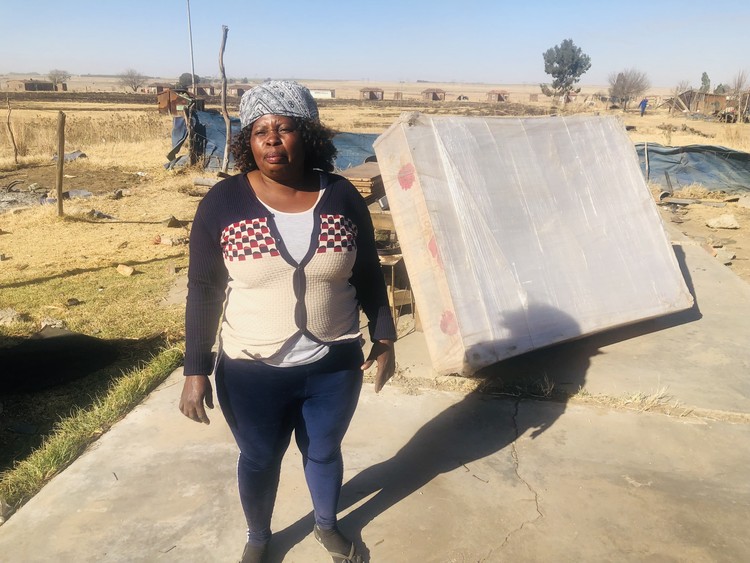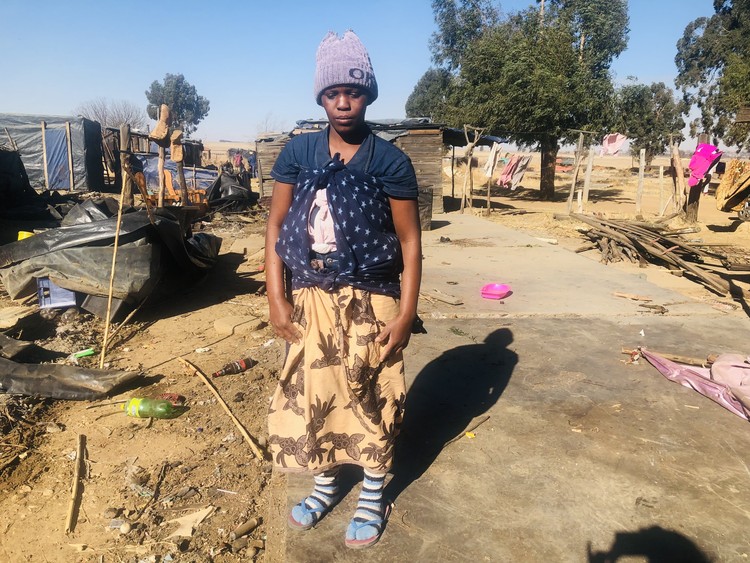Army destroys shacks in Marievale, leaving families homeless
Lawyers for Human Rights plans to go to court again
Sandra Masinga spent several nights sleeping in the cold next to where her shack used to be, in Happiness Village in Marievale. Photos: Kimberly Mutandiro
- Some 30 families have spent days sleeping in the open after their shacks were destroyed by the army last week.
- The families were evicted from the Marievale military base in 2017 and set up shacks nearby, in what they called Happiness Village, on army land.
- The army sought to evict them and in 2018 the SA National Defence Force and the City of Ekurhuleni were ordered by the Pretoria High Court to provide adequate alternative accommodation.
- Some of the families were moved to temporary housing in Ebenezer in Duduza, but there is not enough housing for everyone.
Sandra Masinga spent several nights sleeping in the cold next to the spot where her shack used to be in Happiness Village, her belongings piled beside her. Her shack, and those of over 30 other families, was removed by the South African National Defence Force a week ago under the guise of relocating them from army land to Ebenezer in Duduza.
But it was only after the shacks were removed that she and the others were told that their new homes had not been built.
Masinga, who is a Mozambican national, has moved into one of the few remaining shacks, along with other adults and six children. The army has not allowed the families to rebuild their shacks.
“The army should not have removed my shack. Now I don’t have a place to sleep and have been suffering due to cold nights for the past week,” said Masinga, who has lived in Marievale for more than 20 years.
After being brutally evicted from houses on the Marievale Military Base in 2017, the families built shacks near their old homes and called the area Happiness Village. For the past seven years, the families, represented by Lawyers for Human Rights, have been in and out of court battling against their eviction from Happiness Village.
In 2018, the army and the City of Ekurhuleni were ordered by the Pretoria High Court to provide adequate alternative accommodation for the residents.
Some residents voluntarily agreed to be relocated to the Zamani informal settlement, while others refused to be relocated, saying they worked nearby or had children in nearby schools. In total, about 85 families remained in Happiness Village.
The municipality presented the remaining 85 families with a new relocation plan in February. They were to be moved to corrugated iron shelters in Ebenezer in Duduza by June 30. But according to community representative Chris Koitsioe, the relocation process has been chaotic, with both the army and the municipality failing to provide enough shelters for all the residents, claiming that they will only provide accommodation for residents who were listed in a 2020 court order. Last week, on Tuesday, only 54 families were relocated, while others remained stranded.
Meanwhile, those who were relocated last week say their new shelters are not strong enough and that they have not been provided with toilets or water. Some say their shelters have already been destroyed by the wind.
“What the army and the city have done is in breach of our Constitution, which provides that no one should be evicted without being provided adequate alternative accommodation,” said Koitsioe, who has insisted on staying in Happiness Village with the others until everyone has been provided with shacks for relocation.
Lawyers for Human Rights say they will go back to court to challenge the fact that the municipality did not provide adequate alternative accommodation.
“Our clients are willing to relocate and cooperate. Unfortunately, the municipality did not meet their timeline, and the quality of alternative accommodation being provided is poorer than the people’s previous homes. The municipality does not care about poor people, and the people’s dignity is not being recognised. It’s amazing how they have removed people from their homes while we are having such bad weather,” said Louise du Plessis from Lawyers for Human Rights.
“We do not have a choice but to go back to court.”
Asanda Dhlamini, who shared a shack with his brother, says their home has also been removed. He and his brother are now sharing one of the remaining shacks with others.
“I have no problem with moving, but it was wrong for the army to remove our shacks, leaving us outside in the cold,” he said.
Sarah Ngoveni says she would rather live in her old shack in Happiness Village than in the temporary housing she has been moved to.
Although she has already been relocated, Sarah Ngoveni has been coming back to Happiness Village, hoping that she will still be allowed to live there. She does not like her new shelter because it is smaller than the old one. The roof of the new shelter was recently blown away by the wind.
“If we had a choice, I would prefer to live here in Happiness Village,” she said.
Acting Director of corporate communications at the Ministry of Defence, colonel Selinah Rawlins, said the relocation plan for Happiness Village in Marievale had been prepared by the Ekurhuleni Municipality, and only the municipality could give details of how the plan had been executed.
However, she said the SANDF had been granted a court order to evict all “unlawful occupiers,” given the fact that the SANDF wants to use the land and its facilities for military purposes.
GroundUp contacted Zweli Dlamini, spokesperson for the municipality of Ekhurhuleni, who promised to respond but had not done so by the time of publication.
Support independent journalism
Donate using Payfast

Don't miss out on the latest news
We respect your privacy, and promise we won't spam you.
Next: Another Makhanda water supply deadline missed
Previous: Understanding the Namibian court ruling that decriminalised gay sex
© 2024 GroundUp. This article is licensed under a Creative Commons Attribution-NoDerivatives 4.0 International License.
You may republish this article, so long as you credit the authors and GroundUp, and do not change the text. Please include a link back to the original article.
We put an invisible pixel in the article so that we can count traffic to republishers. All analytics tools are solely on our servers. We do not give our logs to any third party. Logs are deleted after two weeks. We do not use any IP address identifying information except to count regional traffic. We are solely interested in counting hits, not tracking users. If you republish, please do not delete the invisible pixel.


